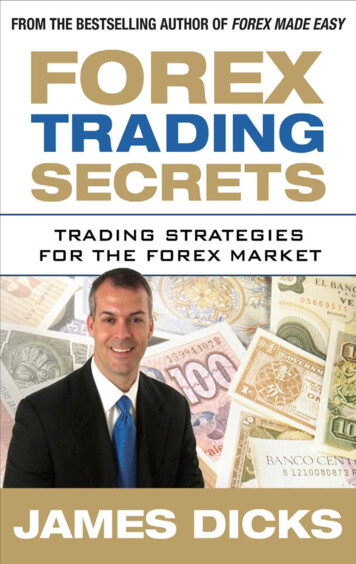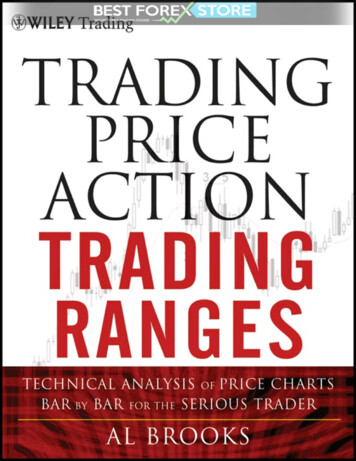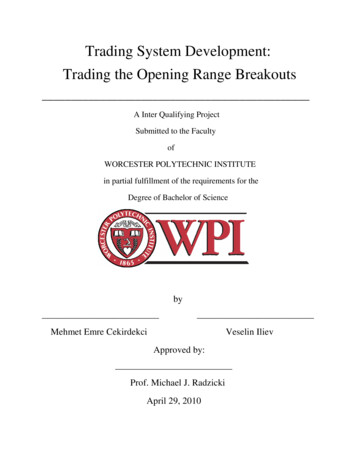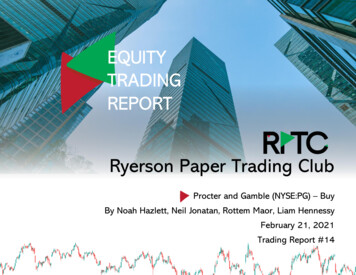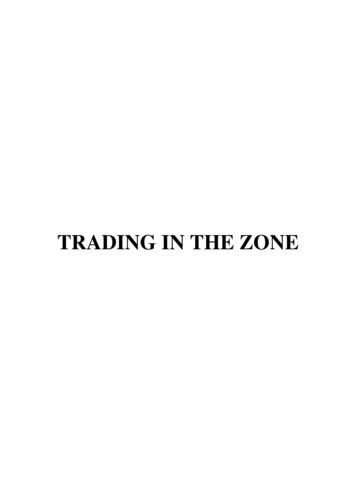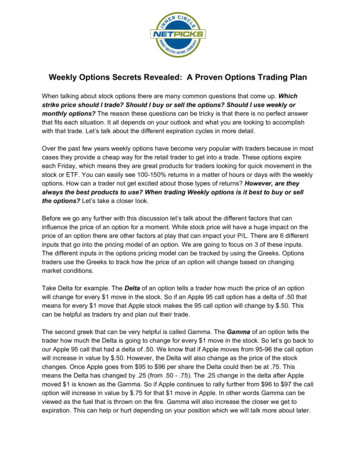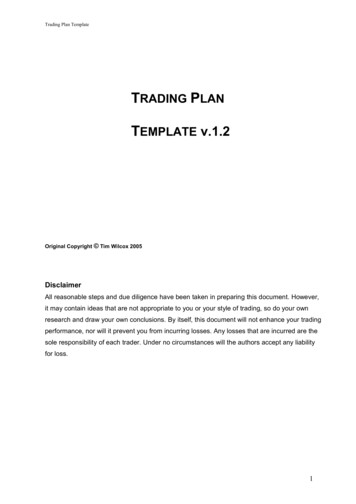
Transcription
Trading Plan TemplateTRADING PLANTEMPLATE v.1.2Original Copyright Tim Wilcox 2005DisclaimerAll reasonable steps and due diligence have been taken in preparing this document. However,it may contain ideas that are not appropriate to you or your style of trading, so do your ownresearch and draw your own conclusions. By itself, this document will not enhance your tradingperformance, nor will it prevent you from incurring losses. Any losses that are incurred are thesole responsibility of each trader. Under no circumstances will the authors accept any liabilityfor loss.1
Trading Plan TemplateREVISION 0406-04Tim WilcoxIsotonicIsotonicFirst releaseReformatting and minor revisions to text.1. Customisation of original document.2. Inclusion of questions from Van Tharp'sobjectives list.3. Additional appendices.2
Trading Plan TemplateContentsTable of ContentsREVISION HISTORY.21. Self Assessment.61.1 Why do I want to be a trader? .61.2 What is my style? .61.3 What are my strengths and weaknesses?.61.3.1 What are my psychological strengths and weaknesses, especially in terms of tradingsystem development?.71.3.2 What are my strengths and weaknesses in terms of personal discipline?.71.4 Do I tend to get compulsive? (i.e., get caught up in the excitement of trading), havepersonal conflicts? (i.e., have a history of conflicts with my family, at my job, or duringpast trading experience), or have any emotional issues that constantly crop up, such as fearor anger?.71.5 Am I in the right frame of mind? .71.6 How much time during the day do I have to devote to trading? .91.7 When I'm trading, how many distractions can I expect to have? How will I deal withthose distractions?.91.8 How much time do I expect to devote to developing my trading system? And to doingmy personal psychological work, and to working on my business plan for trading?.91.9 What are my computer skills? What skills do I need before I begin this tradingventure?.91.10 What do I know about statistics?.91.11 How would I rate my market knowledge? .102. Defining My Objectives.112.1 What are my annual trading goals? .112.1 What are my monthly trading goals? .112.2 What are my weekly trading goals? .122.3 What are my daily target goals? .122.6 How much money do I have personally? How much of that money could I afford tolose? For example, most funds stop trading at 50 percent. How much risk can I afford totake on a given trade?.132.7 How much money do I need to make each year? Do I need to live off that money?What if I don’t make enough to live off? Can I make more than I need to live off so thatmy trading capital can grow? Can I stand regular withdrawals from my trading capital topay my monthly bills?.132.10 How will I know my plan is working, and how will you know’ when it’s notworking? What do I expect from my system in various kinds of markets? Trending?Consolidating? Highly volatile?.143. Markets, Instruments & Time-frames .153.1 Which markets will I trade? .153.2 Which Instruments will I trade? .153.2.1 What kind of markets do I want to trade? Is it appropriate to specialize? Do I want totrade only liquid markets, or are there some illiquid markets I’d like to trade?.153.3 What beliefs do you have about entering the markets? How important do you believe3
Trading Plan Templateentry to be?.153.4 Which time-frames will I trade? .154. Tools of the Trade.164.1 Which financial vehicle will I use to trade? .164.2 Which broker and trading platform will I use to trade?.164.3 Which software & data-feeds will I use to trade? .165. Before the Market Opens . . . .175.1 What is my daily pre-market routine? .175.2 Have I analysed my last trades?.175.3 Have I any open positions? .175.4 What are the general market conditions? .185.5 What will I do each day, hour by hour? .186. Risk & Money Management .19GENERAL RISK MANAGEMENT .196.1 What is my attitude towards risk?.196.2 What is my overall market risk? .196.3 What about broker and hardware risk? .196.4 What is my strategy risk? .19SPECIFIC RISK MANAGEMENT .206.5 What is the probability of a successful trade? .206.6 What is the risk/reward ratio .206.7 What is my risk per trade? .206.8 Given my goals in terms of returns and draw-downs, what kind of initial risk stop do Iwant? If it’s close, will I be able to get right back into the market so that I won't miss amove?.206.9 Where will I place my stop loss orders? .216.10 When will I stop trading?.21GENERAL MONEY MANAGEMENT .226.10 Large draw-downs and profits – what will I do? .226.11 Which money management approaches will I use? .22SPECIFIC MONEY MANAGEMENT .236.12 How will I lock in profits? .236.13 How will I determine my position size? .236.15 What will I do in terms of money management (or “position sizing”)?.237. Exit Strategy .247.1 Losing trades - Will I exit before my stop is hit? .247.2 Losing trades – Which signals will see me scaling out of the trade? .247.3 Winning Trades – Which signals will see me exit completely? .247.4 Winning Trades – Which signals will see me scaling out of the trade? .248. Trade Strategies, Set-ups & Entries .258.1 Which strategies will I trade? .258.2 What are my set-ups? .258.3 How will I find my set-ups? .258.4 Which signals will trigger my entry? .269. After the Market Closes . . . .279.1 Have I recorded today's trades? .279.2 Did I execute today's trades according to my plan? .279.3 Have I completed my trading journal? .274
Trading Plan Template10. Discipline.2810.2 What are my promises to myself? .2810.3 What questions will I ask after a winning trade? .2810.4 What questions will I ask after a losing trade? .2810.5 What steps will I take to improve my trading career? .28Appendix A: Entry Conditions or Signals.30Primary Set-ups.30Secondary Set-ups.30Appendix B: Exit Conditions or Signals.31Primary Set-ups.31Secondary Set-ups.31Appendix C: Complete examples.32Appendix D: Back-tested and/or Forward tested results.33Appendix E: Trading Room Set-up.34Appendix F: Disaster Recovery Planning.35Appendix G: Personal Development.365
Trading Plan Template1. Self Assessment1.1 Why do I want to be a trader? I want to be a trader because . . . (I am excited by the challenge to be successful in adiscipline that is notoriously difficult and where, allegedly, 90% of participants fail). My primary objective in wanting to be a trader is to . . . (generate sufficient annualincome of in order to support my family). My secondary objective is to . . . (spend more time with my family and enjoy thefreedom of being able to trade from anywhere in the world). These objectives are important to me because . . . (they provide purpose anddirection to my life and enable me to lead a more balanced one). I believe I can achieve my objectives because . . . (my name is L
Trading Plan Template REVISION HISTORY Version No. Date Author Changes 1.0 2005 Tim Wilcox First release 1.1 06-04 Isotonic Reformatting and minor revisions to text.

